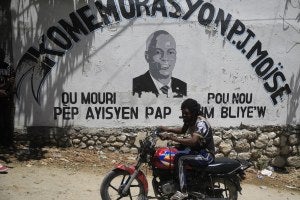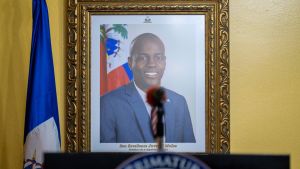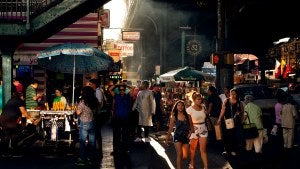Unraveling Haiti Two Years after Moïse's Assassination
 Play Podcast
Play Podcast
About the Episode
Haiti marks the two-year anniversary of President Jovenel Moïse's assassination. On Deep Dish, we unravel the intricate dynamics that make Haiti's path to stability so challenging. Haitian journalist Monique Clesca and the International Crisis Group’s Renata Segura offer their perspectives on the complexities of the situation and explore pathways on Haiti's struggle for a brighter future.
[Lizzy Shackelford: INTRO: This is Deep Dish on Global Affairs going beyond the headlines on critical global issues. I'm your host, Lizzy Shackelford with the Chicago Council on Global Affairs.
As the world approaches the two year anniversary of the assassination of Haitian President Jovenel Moïse tensions remain high and the nation stands at a critical crossroads.
(AUDIO SOUNDBITE)
Today we delve into the complex web of factors that have contributed to Haiti's persistent challenges and seek to shed light on why the path to stability and progress seems so elusive.
Here with me to explore is Renata Segura, the Deputy Program Director of Latin America and Caribbean at the International Crisis Group.
And we have Monique Clesca. Monique is a Haitian journalist, a former United Nations official, and a member of the commission to search for a Haitian solution to the crisis. Monique says that Haiti's current crisis didn't start with Jovan Moe's assassination, but that it did get worse…]
Monique Clesca: The current crisis started in July 2018. It was during the World Cup. They were rioting because Jovenel Moïse had raised prices, gas prices, But while rioting, they were also asking for health education. And I remember in particular a youth saying, Jovenel Moïse must know the country is not his alone, it is ours also. And this was followed by months and months of massive demonstrations. Anti-corruption, anti impunity demonstrations. the major complaint was the fact that several government officials, former and actual under Jovenel Moïse had stolen the money from the 4 billion PetroCaribe funds. that was political. It was social, and it went on 2019, it went on 2020 and Jovenel Moïse is then died. Practically four years later in 2021 So it exacerbated the crisis because even before Jovenel Moïse died, there was a constitutional crisis because he wanted to change the Constitution. He also wanted to hold election. So it was a crisis state. From that time, if we go back even further, the major issue in Haiti is political. It is because it is an unequal state, no matter how you slice it, no matter how you, go about saying it started then, or it started that. It is an unequal state. The majority of Haitians do not have access to minor social services, let alone normal social services. So I wanted to set that up so you know, the major issue is inequality in Haiti and the fact that government, have not considered that their major. Task was to provide services to the population or satisfy the population. So, I think the framework then is historical in terms of inequal society and then the current crisis, starting in July 2018 with the riots. And then exacerbating with Jovenel Moïse's assassination with the fact that the president is assassinated, and we are now in a state that has no legitimate leader.
Lizzy Shackelford: So we're talking about crises upon crises upon crises here and a, a long way back. I do wanna get a sense of what role the assassination has played in bringing us to where we are today. Renada, could you talk a little bit about what we know about that and how it has further complicated the challenging political and security situation?
Renata Segura: I mean, I think a big part of the problem is that actually we don't know much about what happened and why, the president was assassinated. The US has, 11 suspects in prison. there's been over 40 people that have been accused of the assassination, including 18 Colombian mercenaries that were the ones that physically came into the house and shot Moïse that night and the principal sort of suspect right now is Christian Sanon a Haitian American. It is very likely that there are very powerful people in Haiti that were behind the assassination, but that we don't know. There's a lot of speculation about current officials who may have been involved, although there is no legal proof at this moment. And so part of the mystery of what happened and what were the really dark interests behind, Moïse death is what makes it all so much more complicated because there's clearly a lot of layers in the political scene. What has happened since the assassination of Moïse though, is that there has been this, vacuum power, since two years ago, and as Monique was very well, saying the fact that. Hari was not appointed as a prime minister in any legitimate way. The international community sort of turned to him, as a person to, go in power. but not in any way elected by Haitians. And so he's widely seen as an illegitimate leader. and that has made it very difficult for the state to function properly. Besides that, it has also triggered a deterioration in this security situation in which gangs that had previously been operating almost exclusively in some areas in slums or some neighborhoods in the major cities have used this power vacuum to increase their territorial power and fight each other for control, so we have a very weakened, national police, an almost non-existent, army that has just being recreated. and an increased pressure on the population, which is the target of kidnapping, of extortion, of sexual violence, and a state that is really incapable, to address these, violence situation which has in it. self created a humanitarian crisis. We saw the resurgence of cholera last year. There is, incredible numbers of hunger. the WFP recently sent an alarm about the humanitarian hunger crisis. there's a lack of access to health, obviously, to schools in many neighborhoods. People cannot circulate easily. So the political crisis sort of triggered this incredible security crisis, which in turn has made the humanitarian crisis even worse.
Lizzy Shackelford: Monique, how important do you think it is to get to the bottom of what actually happened with that assassination? Is that important for Haiti to move on to its next steps or is that, just a distraction?
Monique Clesca: I don't think it's a distraction, but I don't want it to become a distraction. it is not a distraction because it is a justice issue. and, uh, as social services are not functioning, justice system also is not functioning. It is that the gangs are not just, there are gangs that are functioning. Or there is the police. that is weak, that is not functioning. It is something that was built that was constructed by Jovenel Moïse and before him, by Michelle Marli. so there are clear linkages between the gangs and the politicians. So it is not like you have the gang somewhere and then you have the politician somewhere. No, it is a criminal state. That works with the gangs. And one thing that is important is the economic sector also is involved. So you have the economic sector and the political sector working to together hand in hand with the gangs. There was a prominent human rights. personnel who said that the director of the police is involved with the gangs. They just sectioned a major men in the economic sector as well as three gang members. So somebody just said, well, do you want this name to be associated with the gangs? But they have been associated. So it is true we have moved forward unfortunately towards, Almost a mafia state, as Moïse's name says. And we have a dire humanitarian situation that is extremely heartbreaking to deal with. So, to go back to your question, no, it is not a distraction. It is serious, but the people in power, are the ones who must respond and provide answers. Things are not functioning. But you know, we want it to be solved. It is important for the nation that it be solved, but I honestly do not believe that with these people in power, a crime syndicate that it will be solved.
Lizzy Shackelford: So this brings us to the very challenging question of what is the best path forward? Because Monique as you say, criminality and corruption are very closely intertwined with what appear to be the most powerful players in Haitian politics. As international partners look to support Haiti and Haiti has long relied on a lot of external assistance, how can international partners play a role in assisting Haiti and moving forward without inevitably, feeding into the problem of corruption and the criminality of Haiti's leadership?
Renata Segura: Yeah, I mean, Lizzy, this seems to be the million dollar question, how, we should move forward. And that question has sort of two aspects to the answer, right? One is the more political side and then also the security side. it is very clear that Henry is the person in power in Haiti would like it or not, and so the international community is dealing with him, but it is incredibly important that whatever intervention the international community does, doesn't just consolidate an illegitimate leader in Haiti for a long term. And this is something that has occurred in the past, and it is of the greatest importance that, in whatever way it's possible, the international community presses, prime Minister Henry to really create institutions that represent a power sharing agreement for this transitional government before the next elections, take place. one of our great worries at Crisis Group is that what we may end up doing is once again consolidating a regime, that Haitians don't like, which has happened in the past and has been tremendously detrimental to Haiti's stability. For the way in which democracy has not been able to flourish, et cetera. So on the one hand, what can be done is to really, use all possible powers of persuasion. And the international community has enormous powers of persuasion in the Haitian case to, bring in actors such as Monique, others in the opposition civil society to really create a power sharing agreement that, creates, A government that is legitimate enough that when elections do happen, the majority of Haitians feel these are, fair, adjust, and will embrace, the regime that comes, after, in terms of security. Um, we do think that the current, security forces in Haiti are not able to respond to the threats. And life in Haiti is incredibly difficult for many, many people. And so, we had supported the idea of sending foreign troops to try and bring the gangs under control. Despite knowing that, it comes with a history of failed military interventions that make the situation very difficult, and it also comes, with operational challenges that are going to be, very complicated. You know, a lot of the gangs live within the communities. It's not a matter of you can just come and do an operation and cleanly extract these people. They are surrounded by civilians. The possibility that this has, collateral damage is very high. This is something that obviously we would all like to avoid, but the reality is that day after day a lot of Haitians are requesting international aid to help them, be able to control a little bit of what's happening in Haiti. So that would be my combo, I think. forces to support the police, with very specific ways in which we can know they can do that without, enforcing corruption and really pressuring Henry to make a power sharing agreement.
Lizzy Shackelford: And Monique, why don't you tell us about your thoughts on how a Haitian led transition could occur and what steps you've taken on that path?
Monique Clesca: In the March 2021, way before Jovenel Moïse died one of the things that we did was really talk to different sectors, the political sector, trying to find out what they believed the crisis was and what short-term solution they thought as well as long-term solution. And one of the short term solution that they had come up with was the fact that because it is a governance issue, because the governance is so rotten and so corrupt and so criminal, that the Haitian led solution should be a two year transitional government. Where we could level the playing field. There could be new actors and actresses who are in a power, in government power, and who are not corrupt, not linked with gangs or otherwise, and they can run the government and this way, then prepare for elections within those 24 months. Now what has happened, and I think that is very interesting. We proposed, this, pretty much before Jovenel Moïse, died. We started working on it and this agreement, which is called the Montana Accord, was put to signature to a different political group, civil society groups and personalities In August 2021, about a month after, close to two months after Jovenel Moïse died. Now Ariel Henry has been in power now for 23 months. There have been over 10 massacres. Since he has been in power, the gangs have the situation from about 40 to 50% of Port-au-Prince that was taken over by gangs is now about 80% and the justice situation judges are being killed or some of them are, being threatened and shot at. and hunger when you look at the data set from when Henry started to right now the situation is absolutely worse than it was. it is beyond heartbreaking because when you hear statistics of about 4 million of Haitians going hungry, that's about one third of the population that is unable to eat. So, we are in dire straits and we cannot wait. And I said to myself, this is very interesting that this is where the international communities meddling. And no Jovenel Moïse’s determination to stay in power all alone has brought us, whereas the Haitian led solution we proposed was 24 months. Meaning had we been in power, had we been able to convince the international community who pretty much runs Haiti right now? That you know what? this is a clean governance agenda to move things forward. What it could have been like, I know it would not have been as heartbreaking as it is now. It would not have been the criminals still in power. So the Haitian led solution is to clean up this system to put new faces, new values, new ideas on the table. And we do have a roadmap in terms of how things, should move forward in different sectors, whether it's education, whether it is economics, et cetera. So this is the solution we are offering. But that for some reason that the international community does not like or is not ready to push, and what is supported by the international community, which is death, which is hunger, which is crime, which is the gangs. And that's why we are saying that the Montana Accord, it's been two years. We have offered a solution and we have shown our good faith and our willingness to bring consensus, but it's not yet happening, but we do believe it will happen.
Lizzy Shackelford: If the international community after the death of Moïse, had not vocally come out and called on Henry to create a government. Where should the succession of leadership have gone at that stage? And is there a scenario in which civil society's kind of collective organization could have been given a stronger role there?
Monique Clesca: There really was no scenario because Jovenel Moïse already, was kind of outside of the constitutional, uh, realm. we believe that he should have left a year before, but he was still president. And he was president who was legally elected, even though there was, differences in terms of when his term of office was to end. But there was a prime minister who was in power, and the prime Minister with a tweet from the international community. They basically said, well, Ariel Henry was the one who Jovenel Moïse mentioned he wanted, so form your government. So, in essence there was, and regardless of how we feel about Jovenel Moïse, but he was the prime minister in power. So basically, he could have, led the government and he could have if he was willing to find some consensus with the kind of situation that there was there, so that we could have found a solution. But all of these are could have, could have, could have, because none of it actually happened. So, it is very difficult. Regardless, even with Ariel Henry in power, the Constitution gave him a certain number of days to find a solution, but we know also that in 90 days there was not a possibility to find a solution, but with a drunk with the power and support of the international community, he kind of, well, you know, my shoulders are big. And, let me just move forward. And he has continued to move forward for the last 23 months with the support of Canada, France, and the United States as a major player.
Renata Segura: I mean, I think that question exactly goes to the difficulty of the situation because we were talking about, uh, as Monique says, something that was outside of the constitutional framework on what the succession should have been. But in particular on the question of how could have civil society had a play, a bigger role. One is obviously the UN, the international community, you know, they are used to dealing with governments. That is their constituency. That is who they speak to. And so, a proposal like the one from Montana really came outside of the framework in which the international community is comfortable operating. a lot of the ambassadors with whom we have spoken, they have said, and I understand where they're coming from. Was not so easy for us to say, okay, you people, you all seem very nice, but there's no constitutional mandate. Nobody elected you. Why are we giving you the power? I think the biggest mistake that they made early on though is that they dismissed the importance of Montana and others politically. Right. For a long time, nobody was talking to anybody that was not just the heavy and the people in power, and I think they very lately understood the weight, the legitimacy, and the importance of actually bringing people like Monique and others to the table. That happened too late. It happened at a time in which Henry had already consolidated the power. It was already going. I think if they had brought Montana and others to the table early on, we could have maybe had a conversation. I understand the institutional limitations for the internationals to just turn to a group of citizens that have no real constitutional mandate and be like, okay, you guys are now in power. But I also think they were very mistaken by dismissing the importance of the voices of the Haitians at that moment and now we're paying the price for that.
Monique Clesca: I think what Renata just said, it must be underlined of dismissing the importance of Haitians, and I think that is one of the biggest problems with the international community because we are a sovereign state. Even if in reality, we are not because we are controlled by the international community that keeps on dismissing our voices, dismissing our interests, dismissing what we are saying in terms of the roadmap. Because one of the things I mentioned is we were demonstrating for four years before Jovenel Moïse died, so this was not an incidental movement. This really was a protest movement asking for social justice. It was a movement asking for the end of corruption and the end of impunity. So, it came from that. So, by dismissing those voices and by continuing to dismissing those voices and saying, yeah, we're used to dealing with that, but careful, you're used to dealing with government, but we're talking about a criminal government. Jovenel Moïse was elected with about, 18% of the electorate participated in the election, which is why very often you have a lot of people saying this is not right. Uh, and we are contesting the date that he should have left, whereas years ago, in 1991, you had, close to 80% of Haitians who were participating. And I think it's led to this aspect of the international communities dismissive and even this dis resentful attitude towards Haitian and Haitian voices. It is that why should I go to elections? Because even when I go to elections, you are going to put in whoever you want. and I think that is something that is important and it's a key element in the Haitian solution, a vision in that we want partnership, we want cooperation. We want to sit down and talk with the international community. We do not want the international community to tell us this is who has to be there. Just like Brian Nichols had told us on January 20th, we don't pick winners and losers. And my response to him is, yes, you have picked a loser this time, just like last time.
Lizzy Shackelford: I'll give you each one last comment. If there is something that you think is the most important single thing that needs to happen and be facilitated in the next year to help Haiti get on a better path, what would you say that should be?
Renata Segura: I'm going to end with a very sort of tiny little thing, which is not a big solution, but it's something that we're looking at a lot of weapons are coming to Haiti from the United States. Through Florida ports. These weapons are a central part of why violence is becoming worse and worse in Haiti. I know that organizing an international force is very complicated. I do think that a lot of people in the international community are very committed to try and help Haiti and people are losing sleep over how to do this. I think cutting the flow of weapons coming from the US to Haiti will be a very easy thing to be done that will have an enormous impact in the life of Haitians and that's something that the US could get on, very quickly and effectively if it decided to do so. that would be my very small step that I think will have giant repercussions.
Lizzy Shackelford: And Monique?
Monique Clesca: Well, what Renata has proposed, we've been proposing this for the last two years, that the United States step up and stop the illegal trafficking of guns because it's coming from the United States and mostly from the Port of Miami. Another thing we have said also is follow the money. And maybe they have started to follow the money, but obeying the laws that they have, perhaps do not, allow them to actually, arrest different people. So, you have the sanctions going, Canada is taking sanctions, so that is something that is important also. And it's the economic sector. it is the criminal sector, and it is the political. All three of them. So, we believe that is important. And what is also extremely important is for the United States to play a more active role in negotiations between the people, the civil society and political groups and powers that be because the United States has A guy called Jonathan Powell, who is he, somebody from State Department, is he not? Nobody knows, and I think there has to be a clear cut. Yes, this is our negotiator. Let us sit together and let us find a solution. At different times, we have been close to getting people together and each time Ariel Henry and his people have gotten away have removed their chairs and left the table. the third extremely important thing that the United States could do. You know what folks? Let us find a solution. And I think we are not far from that because a lot of us from the business sector, civil society, the political groups, we want to do this and the Haitian population, really needs it. We cannot do this alone, and we know this. We know we cannot do this alone. We have huge humanitarian needs. They're huge security needs, and we need to sit down and discuss what can be done. We don't need anybody to tell us we are sending you troops. No. We wanna sit down and say, these are the needs that we have. This is what can be done and let us agree sovereign state to sovereign state on what can be found.
Lizzy Shackelford: Esteemed journalist Monique Clesca and Renata Segura of the International Crisis Group. Thanks so much for helping us gain a deeper understanding of Haiti's struggle, its history that builds into that struggle and some potential paths for a more prosperous future.
Monique Clesca: Thank you.
Renata Segura: Thank you for having me.
[Lizzy Shackelford: OUTRO: And thank you for tuning in to this episode of Deep Dish!
A reminder that we wanna hear more from you, our listeners. So send us an email, or better yet, a voice memo to deepdish@globalaffairs.org -- You can suggest issues you'd like us to cover, guests you'd love to hear from, or you can just let us know how you think we're doing!
And if you're looking for more Deep Dish in your podcast diet, tap the follow button in your podcast app so you get each new episode as it's released. And if you think you know someone who would like today's episode, please share it with them.
As a reminder, the opinions you heard belong to the people who express them and not to the Chicago Council and Global Affairs. This episode is produced and edited by Kyra Dahring and mixed by Frank McKearn at Aphorism Productions.
Thank you for listening. I'm Lizzy Shackelford and I'll be back again next week with another slice of Deep Dish!






Related Content
 Global Politics
Global Politics
The underlying drivers of Haiti's woes are complex, but criminal gangs and political and economic corruption have made the country's plight worse.
 Global Politics
Global Politics
The Caribbean nation is no stranger to chaos, devastation, or interference from outside its borders. After a presidential assassination, what does the future hold?
 Food and Agriculture
Food and Agriculture
This blog is about the disruption and impact COVID-19 has had on climate change and food systems around the world.
 Global Cities
Global Cities
Samuel Kling, Florita Gunasekara, and Steven Bosacker examine the role of cities in generating and strengthening democratic practices as authoritarianism rises across much of the world.